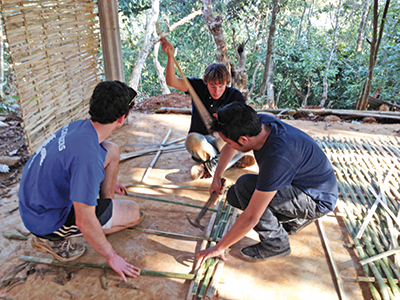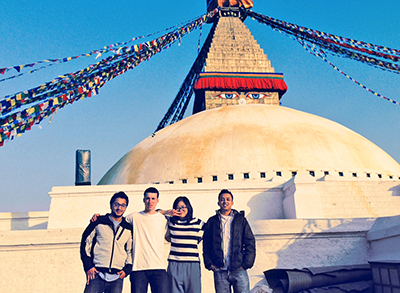
A Passion for Change: A Trip to Nepal, for Nepal
In January, four Wesson Honors students went to Nepal. Two of them were returning to their homeland; two of them were being introduced to the nation that sends more students to Colby-Sawyer than any other. All of them were there to help provide greater access to free education for rural students at Maya Universe Academy (MUA), three hours west of Kathmandu, by building a bamboo classroom. This two-week journey was intended as a first step toward social entrepreneurship and along-lasting relationship with MUA.
The project began with Nepali students Amigo Khadka '14 and Nishchal Banskota '15 and their Pathway classes with Professor of Humanities Ann Page Stecker. She asked them to offer ways to change the world and to consider the resources it would take to realize those ideas. At first, they proposed projects like internships in Europe. Then they began to consider how to create real change where it was most needed. They looked homeward to Nepal, which ranks 157out of 187 countries in wealth, and where aid can go a long way.
In Nepal, private schools are much better than public, but also more expensive and usually found only in urban areas. MUA founder Manjil Rana wanted to provide free education in exchange for having parents volunteer two days per month. This is such a popular and sustainable model that two other Maya schools have been built.
Over the next two years, MUA was selected as the project's focus, and a trip to Nepal was planned. When it grew to involve non-Nepali students so that it would be a true cross-cultural exchange, Kolby Arnold '14, from New Gloucester, Maine, and I applied to take part and came onboard. Kolby and I are both passionate about volunteer work and experiencing new cultures. I was glad to be able to build on previous volunteer experiences working with rural children at home in China and looked forward to teaching art lessons in Nepal. The four of us worked together to raise money to buy a laptop and stationery for the students.
 Our time in Nepal was fantastic and thought provoking. Nishchal and Amigo were wonderful hosts who made the energy and affability of the Nepali culture come alive for me and Kolby. They introduced us to their families, toured us through temples adorned with prayer flags, arranged for an elephant ride through a national park and persuaded us to go paragliding, which really showed us a new perspective. We beat our clothes clean on the rooftop, danced and tried many new foods.
Our time in Nepal was fantastic and thought provoking. Nishchal and Amigo were wonderful hosts who made the energy and affability of the Nepali culture come alive for me and Kolby. They introduced us to their families, toured us through temples adorned with prayer flags, arranged for an elephant ride through a national park and persuaded us to go paragliding, which really showed us a new perspective. We beat our clothes clean on the rooftop, danced and tried many new foods.
When we were somewhat acclimated to our surroundings and the time change, we gathered the tools and gifts we had brought and headed for Damauli and the school.
We drove on winding roads until the pavement turned to red dirt. Arriving at MUA, we saw many children playing with a soccer ball as chickens wandered around.
While we had somewhat arrogantly declared that we would make an impact on the kids at MUA, the truth was that they, and the whole experience, made a bigger impact on us. Kolby suggests that everyone take a chance and live in a developing country to see what it is like and to experience a new culture.
We were thrown into a new environment beyond our comfort zones, but we really had a memorable time living in a rural village, lugging water, taking showers in the open, eating rice and curry vegetables three meals a day, playing cricket and not having Internet access.
We rode in packed vans that functioned as public transportation and rode on top of a bus going down a hill where we could feel every bump and had to dodge power lines. At the school, there was much hands-on work to build a classroom from scratch with bamboo that had to be sliced into thin strips.
 The children at Maya impressed us with their positive outlook on everything. They also showed unending appreciation toward volunteers, regardless of how long they stayed, what they were able to contribute, and whether they had personal interactions. It is a contagious effect, to remember, to value and to be grateful. People tend to take for granted so many wonderful things, but remembering others' merits is necessary.
The children at Maya impressed us with their positive outlook on everything. They also showed unending appreciation toward volunteers, regardless of how long they stayed, what they were able to contribute, and whether they had personal interactions. It is a contagious effect, to remember, to value and to be grateful. People tend to take for granted so many wonderful things, but remembering others' merits is necessary.
Our week at MUA was barely time enough to see everything that is going on at the school—and learn all the students—names! I wish we could have stayed for a month or two, as many volunteers do, but I was content with what we were able to achieve.
We made meaningful bonds that will last for a long time, and I will never forget the children who gathered to sing “You Are My Sunshine” and their shouts of “Thank you, CSC!” as we prepared to depart for New Hampshire.
During my time in Nepal, I realized that education is a universal goal and dream that people can contribute in order to better the world. In Nepal, I saw the same kind of energy, enthusiasm and thirst for knowledge that I had seen in the kids I worked with back in China, and it has ignited a grander desire in me to pursue development related work. I hope that more students at Colby-Sawyer can find a way to get involved, whether it is going to Nepal or fundraising to improve educational opportunities for children.
Watch a video about the trip to Nepal at cscm.ag/tripfornepal .
- by Xiaoxiao Lu '16, history and political studies major
About Colby-Sawyer College
Colby-Sawyer College is a comprehensive college that integrates the liberal arts and sciences with professional preparation. The College's faculty, staff and students strive for excellence in an engaged teaching and learning community that fosters students' academic, intellectual, and personal growth. With a strong emphasis on learning outcomes, including breadth and depth of knowledge, self-growth, creative and critical thinking, and effective communication, Colby-Sawyer prepares students to thrive post-graduation and make a positive impact upon a dynamic, diverse, and interdependent world.
Founded in 1837, Colby-Sawyer is located in the scenic Lake Sunapee Region of central New Hampshire. Learn more about the College's vibrant teaching and learning community at www.colby-sawyer.edu.


